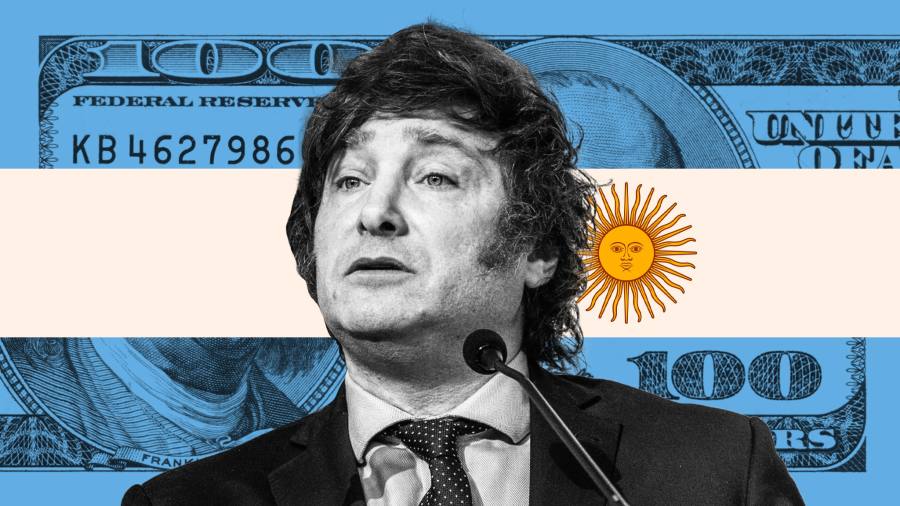
Receive free Javier Milei updates
We’ll send you a myFT Daily Digest email rounding up the latest Javier Milei news every morning.
The emergence of Javier Milei, a self-described “anarcho-capitalist” and radical libertarian, as a contender for the Argentine presidency this October has been greeted by his putative ideological soulmates in the US with a mixture of exhilaration and apprehension.
Until Milei’s appearance, libertarians had seen few promoters of their ideas take the political stage in recent years, aside from Kentucky senator Rand Paul, who continues to plough a lonely furrow first cut by his father Ron. The growing prominence of libertarian rapper-cum-businessman-cum-contender for the Republican presidential nomination Vivek Ramaswamy could yet elicit similar excitement in the movement.
One contributor to the website of the Cato Institute, an American think-tank that promotes the libertarian principles of “individual liberty, limited government, markets and peace”, asked nervously whether Milei could be considered a genuine libertarian.
Many of his policy proposals — cutting taxes and public spending, legalising drugs, weakening restrictions on gun ownership — suggest a thoroughly libertarian scepticism about the scope of political authority and the legitimacy of the state, the writer concluded. But Milei is also an admirer of former US president Donald Trump. And Trump, for all his tax-cutting zeal, remains “staunchly anti-libertarian” on issues such as immigration, trade and drugs.
But another Cato denizen insisted libertarians had little to fear from Milei. He had a “solid understanding” of free-market economics, and his proposal to replace the peso with the US dollar was the right solution to Argentina’s chronic inflation problem. And in any case, his populist anathematising of the “thieves” in the political class was just a “clever way to appeal to more conservative voters without losing libertarian bona fides”.
In fact, there is something to be said for both these analyses. And we can see why if we consider Milei in light of the work of Murray Rothbard, the American libertarian thinker whom the Argentine politician admires so much he named one of his dogs after him. (Another of his five mastiffs is named after free-marketeer Milton Friedman.)
Rothbard, who was born in 1926 and died in 1995, developed a radical version of libertarianism that he called “anarcho-capitalism”. In this worldview, states are “organised banditry” and taxation is nothing but “theft on a gigantic, and unchecked, scale”. As Quinn Slobodian points out in his recent book Crack-up Capitalism, in Rothbard’s ideal polity, “contracts would replace constitutions” and people would not be citizens but “clients of a range of service providers”.
So far, so classically libertarian. However, as Slobodian notes, by the late 1980s Rothbard’s thinking had begun to mutate in the direction of something he would call “paleo-libertarianism” — and it’s here that the parallels with Milei’s worldview become especially clear.
This new brand sought to slough off the accretions of 1960s-style social and sexual liberalism. Instead it saw family, church and community as bulwarks against the over-weaning power of the state. It was on this terrain that Rothbard sought common ground with so-called paleo-conservatism, associated with, among others, Pat Buchanan, who twice sought and failed to secure the Republican presidential nomination in the 1990s.
In a 1992 article entitled “Right-wing populism: a strategy for the paleo movement”, which today reads more like a prophecy than a polemic, Rothbard drew a contrast between America as it is — “a statist country . . . dominated by a ruling elite” — and America as it used to be: the “old America of individual liberty, private property and minimal government”.
Rothbard was unusually clear-eyed about the failings of the libertarian movement in the US, and acknowledged that it had been negligible as a political, as opposed to intellectual, force. Libertarians, he argued, had been highly effective at spreading “correct ideas” about the free market and minimal state — but as “strategists for social change” they had “badly missed the boat”. As for the Libertarian party, founded in 1971, Rothbard declared it “finished, over, kaput”, even though it was then still fielding candidates for president and continues to do so.
The key, Rothbard thought, was to find someone who could take up the fight inside the Republican party and expose the “corrupt ruling elite and how they benefit from the existing system”. He did not live to see the Trump victory in 2016 and it is unclear whether he would have welcomed it — but in Milei, at least, he has a very faithful student, and libertarianism a new mouthpiece.